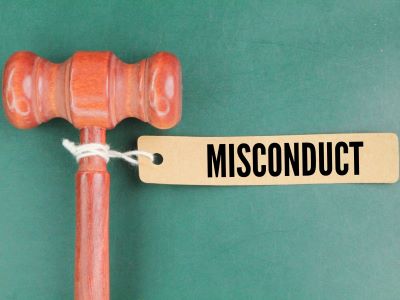Whenever an employer investigates employee misconduct, there’s a chance it will find—and may have to disclose—negative facts. This is true when a hospital investigates the medical conduct of a doctor, or an employer investigates an employee for potential harassment. In both instances, and in the absence of malice, those investigations are protected by the litigation and the common interest privileges.
Mounting Problems
Dignity Health hired orthopedic surgeon Troy I. Mounts to work in a spine surgery practice at the San Luis Obispo French Hospital Center. Concerns regarding his clinical competence arose almost immediately. At the same time, he complained he wasn’t getting staff support or adequate time in the operating room to perform complex surgeries.
Dignity put Mount’s complex surgeries “on hold” and required him to complete a previously scheduled surgery with a second surgeon he hadn’t worked with before. Disputes regarding his practice continued.
Professional Review
In December 2015, Dignity’s chief of the medical staff, chief of anesthesiology, vice president of medical affairs, and chair of the surgery department requested that Mount refrain from operating until they completed a focused professional practitioner evaluation (FPPE) review. Mount agreed to this restriction. Two days later, Dignity’s medical executive committee (MEC) sent Mount a letter notifying him that Dignity would be required to submit a report to the Medical Board of California under Business and Professions Code section 805 if the voluntary restriction of privileges lasted longer than 30 days.
When Mount attempted to rescind his voluntary restriction of privileges, the chief of staff responded that he could do so, but Dignity could respond by summarily suspending his privileges. A suspension that lasted longer than 14 days would also require an 805 report.
Dignity filed an 805 report with the medical board and with the National Practitioner Data Bank (NPDB). The NPDB report stated that the “basis for action” was “immediate threat to health or safety.” About two weeks later, Dignity’s MEC sent Mount a memorandum regarding the ongoing peer review investigation. He submitted a rebuttal statement.
After an MEC meeting, the hospital chief of staff called Mount to advise him that, although nothing was final yet, the committee’s decision was probably not going to be favorable to him. He encouraged Mount to resign.
Mount resigned on February 10, 2016, and subsequently lost privileges at two hospitals in California. He was considered for employment at a hospital in Montana and another in Tennessee. Dignity declined to provide records relating to the FPPE to either entity. He contends he lost both employment opportunities because of Dignity’s refusal to send the NPDB report.
Response Is Mounted
Dignity sued Mount to recover a recruiting bonus it had paid him. Mount filed a cross-complaint alleging retaliation in violation of the health and safety code, intentional interference with prospective economic advantage, and unfair competition.
Dignity filed an anti-SLAPP motion to strike the cross-complaint. The anti-SLAPP statute authorizes a special motion to strike a claim “arising from any act of that person in furtherance of the person’s right of petition or free speech under the United States Constitution or the California Constitution in connection with a public issue.”
Deciding whether to grant an anti-SLAPP motion to strike requires the court to conduct a two-step inquiry. At the first step, the moving party has the burden to establish that the claims alleged against it “arise from” one or more of the statutorily defined categories of protected activity. At the second step, the burden shifts to the other to demonstrate “a probability that [he or] she would prevail on the particular claim.” Put another way, it “must demonstrate that the complaint is both legally sufficient and supported by a sufficient prima facie [minimally sufficient] showing of facts to sustain a favorable judgment if the evidence submitted by the [moving party] is credited.”
In conducting this inquiry, the court doesn’t weigh evidence or resolve conflicting factual claims. It accepts the employee’s evidence as true and evaluates the hospital’s showing only to determine if it defeats the doctor’s claim as a matter of law. Claims that have “minimal merit may proceed.”
Two Privileges
Here, even under that liberal standard, Mount couldn’t state a claim: Two legal privileges stood in his way. The litigation privilege confers an absolute privilege on communications made as part of a judicial or other “truth-seeking” official proceeding. This includes communications made in connection with a medical peer review proceeding. As applied to a peer review proceeding, the privilege is intended to afford participants unfettered access to the proceeding without fear of subsequent actions. To accomplish that purpose, the privilege extends to steps taken before and after the peer review itself.
All the conduct alleged by Mount here was found to be covered by the litigation privilege. The decision of whether possible privileges should be provided, and whether conduct occurred about which regulatory officials should be notified, fell within the litigation privilege. Even if those communications caused employers not to hire Mount, they are still privileged.
The second applicable privilege is the common interest privilege, a communication made without malice by and to interested persons to provide requested information. Here, within the hospital setting, communications about Mount that were of interest to the performance of duties in the hospital were privileged. Dignity Health v. Mounts (CA2/6 B325563 9/17/24).
Bottom Line
This decision is important to employers to protect findings and communications that you make in the course of quasi-judicial investigations. You are required to investigate charges of harassment, mistreatment, and the like, and your efforts doing so are generally privileged. Similarly, management and employees need to discuss perceived workplace problems without fear of being sued for defamation. This decision protects those considerations.
Mark I. Schickman is the editor of California Employment Law Letter. You can reach him at mark@schickmanlaw.com.

